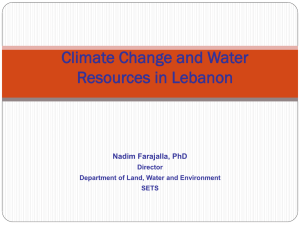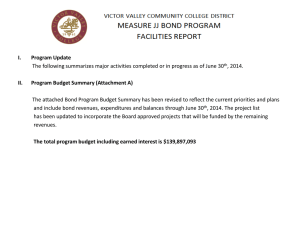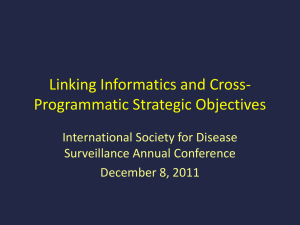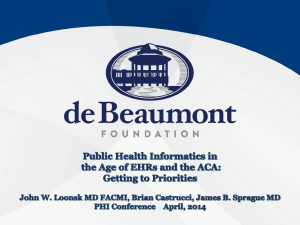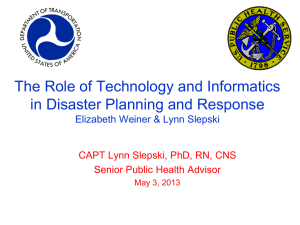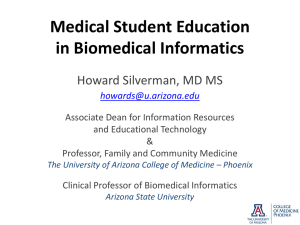Take a look - Gainesville Area Chamber of Commerce
advertisement
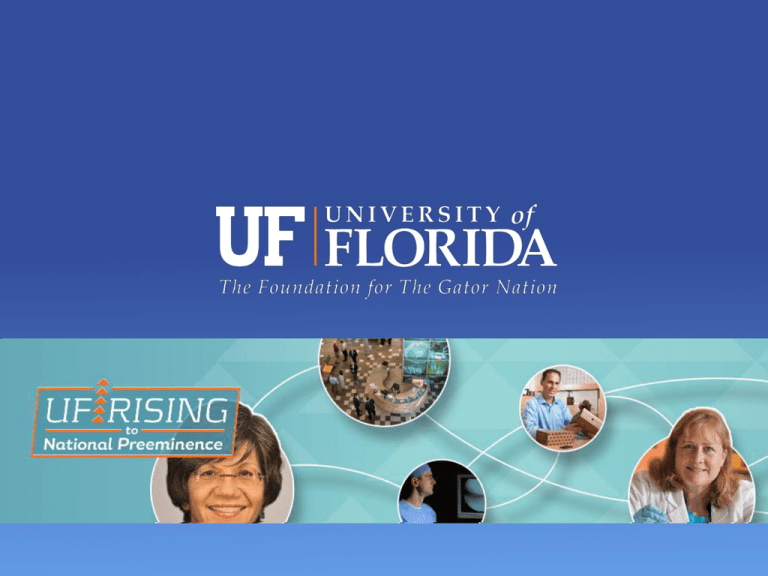
UF Rising Preeminence Hires 25 Engineering/Life Sciences Researchers Dr. Ana Conesa Agricultural & Life Sciences/Microbiology Topic: Informatics for Life Sciences Dr. Ana Conesa is co-founder of BioBam and the head of the Genomics of Gene Expression Group within the Bioinformatics and Genomics Department at the Prince Felipe Research Institute (CIPF), Valencia, Spain. She did her PhD in fungal genetics at the Dutch Institute for Applied Sciences (TNO), which she followed by leading a pioneering Bioinformatics project in the Toxicology Department in the same institute. She then moved to the Valencia Agricultural Research Institute to set-up a Bioinformatics service. In April 2007, she joined the CIPF where her research activity now focuses on Functional Genomics, in the development of bioinformatic methods for the functional annotation of non-model organisms, the statistical analysis of transcriptomics data and the integration of systems biology data, in particular, Blast2GO. She has published nearly 50 peerreviewed scientific articles related to applied bioinformatics. (Anticipated start date of 8/30/14) Dr. Arie Havelaar Agricultural & Life Sciences/Animal Sciences Topic: Food Hub Dr. Arie H. Havelaar graduated in Chemical Engineering with specialization in Technical Microbiology (with honours) at the Delft University of Technology. He obtained his PhD at Utrecht University (Bacteriophages as virus models in water treatment) and also obtained an MSc in Epidemiology at the Netherlands Institute of Health Sciences (Erasmus University, Rotterdam). Arie Havelaar is deputy head of the Laboratory for Zoonoses and Environmental Microbiology at the National Institute for Public Health and the Environment (RIVM) in Bilthoven, the Netherlands. He also holds a chair in Microbial Risk Assessment at the Institute for Risk Assessment Sciences at the Veterinary Faculty of Utrecht University in the Netherlands. Arie Havelaar’s research covers the broad field of public health aspects of pathogens in food and the environment, and the effectiveness of preventive measures. Currently, his attention is mainly focused on development and application of microbiological risk assessment and the burden of foodborne illness. He is (co-) author of more that 100 scientific publications, several books and numerous scientific reports. Arie Havelaar is director of the WHO Collaborating Centre for Risk Assessment of Pathogens in Food and Water at RIVM. Within Med-Vet-Net, he is active as Institute Representative and Work Package leader in the Risk Research thematic area. He is a member of the Biohazards Panel of the European Food Safety Authority and has chaired the Scientific Committee of CHRO 2007 (Rotterdam, the Netherlands, 2-5 September 2007). His contributions to microbiology were honoured by election as a Fellow of the American Academy of Microbiology, and he was awarded the German Rudolf Schülke Hygiene Preis. (Anticipated start date of 10/1/14) Dr. Riccardo Bevilacqua Engineering/Mechanical and Aerospace Topic: Autonomous Systems Education University of Rome, “La Sapienza”, Rome, Italy Ph.D., Mathematical Methods and Models for Applied Sciences (Engineering focus), February 2007 Dissertation: “Optimization Techniques for Satellites Proximity Maneuvers” University of Rome, “La Sapienza”, Rome, Italy Laurea Degree (5 years), Aerospace Engineering, December 2002, cum laude Thesis: “Nonlinear Attitude Control for Satellites Platforms Equipped with V.S.C.M.G. (Variable Speed Control Momentum Gyroscopes)” Professional Assistant Professor in the Mechanical, Aerospace, and Nuclear Engineering Employment Department, Rensselaer Polytechnic Institute. 2010-2014. Post-Doctoral Fellow (US National Research Council) at the Mechanical and Astronautical Department, Spacecraft Robotics & NanoSat Advanced Concepts Laboratories, Naval Postgraduate School (U.S. Navy), Monterey, CA. 2007-2010 . Ph. D. Student University of Rome. Project engineer Grupo Mecànica del Vuelo (Grupo GMV) Flight Dynamics Division, Tres Cantos, Madrid, Spain. 2003 (Anticipated start date of 8/16/14) Dr. Lin Yang Engineering/Biomedical Engineering Topic: Biomedical Informatics Lin Yang is an assistant professor with the Division of Biomedical Informatics at Dept. of Biostatistics, and Dept. of Computer Science at University of Kentucky. He leads the Biomedical Imaging Computing and Imaging Informatics (BICI2) Lab. He received his B. E. and M. S. from Xian Jiaotong University in 1999 and 2002, and his Ph. D. in Dept. of Electrical and Computer Engineering from Rutgers, the State University of New Jersey in 2009 (http://www.ece.rutgers.edu/Alumni_in_Academia). He did part of his research in Siemens Corporate Research and IBM T. J. Watson Research Center in 2007 and 2008. He was an assistant professor in the Dept. of Radiology and graduate faculty in the Dept. of Biomedical Engineering in Rutgers University from 2009-2011. His major research interests are focus on biomedical image analysis, imaging informatics, computer vision, and machine learning. He is also working on high performance computing and computer aided diagnostics. (Anticipated start date of 8/16/14) Dr. Patrick Traynor Engineering/Computer and Information Science and Engineering Topic: Cybersecurity Dr. Patrick Traynor is the Associate Professor in the Department of Computer and Information Science and Engineering (CISE) at the University of Florida. His research focuses on the security of mobile systems, with a concentration on telecommunications infrastructure and mobile devices. His research has uncovered critical vulnerabilities in cellular networks, made the first characterization of mobile malware in provider networks and offers a robust approach to detecting and combatting Caller-ID scams. Dr. Traynor is also interested in Internet security and the systems challenges of applied cryptography. He received a CAREER Award from the National Science Foundation in 2010 and was named a Sloan Fellow in 2014. Dr. Traynor earned my Ph.D and M.S. in Computer Science and Engineering from the Pennsylvania State University in 2008 and 2004, respectively, and my B.S. in Computer Science from the University of Richmond in 2002. After promotion and tenure in the School of Computer Science at Georgia Tech, he joined the University of Florida in 2014 as part of the UFRising Preeminence Hiring Program. He is currently the co-director of the Southeastern Security for Enterprise and Infrastructure (SENSEI) Lab, and is also a co-founder of Pindrop Security. (Anticipated start date of 8/16/14) Dr. Shaundra Daily Engineering/Computer and Information Science and Engineering Topic: Human Centered Computing Dr. Daily was an Associate Professor in the School of Computing at Clemson University directing MorphLab. She received her masters and doctorate from the Massachusetts Institute of Technology Media Lab where her doctoral work with the Affective Computing Group involved designing and implementing technology-infused learning environments that provide youth an opportunity to learn about themselves, others, and to gain insight into interpersonal dynamics. Upon arrival at the MIT Media Lab in 2003, Shaundra combined the ideas of constructionist learning and affective computing to create a new system to address the emotional needs of teenaged girls. She designed and implemented an innovative new technology that brought together state-of-the art common-sense machine learning with theories of human learning and constructionism. While building this system, she collaborated with the Future of Learning Group on “The City that We Want” project in which learners build computational models for how they would like to improve their communities. Shaundra also collaborated on RoBallet, which bridged dance and robotics, and created the INNER-active Journal, a digital journal collecting physiological data for future reflection. Prior to Shaundra’s work at MIT, she received a B.S. and M.S. in Electrical Engineering from the Florida Agricultural and Mechanical University – Florida State University College of Engineering. There, she worked on developing algorithms in Matlab for predicting the possibility of student success in entry-level electrical engineering courses. She also designed curriculum for and facilitated Technical OutReach Community Help (T.O.R.C.H.), a program of the National Society of Black Engineers geared toward closing the digital divide. Dr. Daily has been profiled in the American Association for Advancement in Science website profiling African American Scientists; Engineer Your Life, geared towards encouraging young women to pursue engineering careers; and WGBH’s Science City. (Anticipated start date of 8/15/14) Dr. Christina Gardner Engineering/Computer and Information Science and Engineering Topic: Human Centered Computing Dr. Christina Gardner-McCune was most recently an Assistant Professor at Clemson University in the Human-Centered Computing Division of the School of Computing. She has her PhD in Computer Science from GA Tech. She enjoys combining her expertise in computing with her passions for cooking, science, and designing learning experiences and technologies for middle and high school students as well as undergraduates. Her research focuses on gaining a better understand of how students learn and apply STEM and computing content in their everyday lives and to design learning environments to support students in making these connections. She is the co-designer of Kitchen Science Investigators (KSI), a year-long cooking and science program for middle school students, that teaches the science behind cooking. She led the design of the GA Tech I3 Experience (Imagine, Investigate, and Innovate), a series of after-school programs designed to motivate and support high school students in the creation of personal expressions of computing through hands-on, project-based learning. She led the design of the Computational Thinking Olympiad (CTO) for middle school students to learn about computing through a one-day competition where they engage in physically and mentally challenging activities. On the undergraduate level, she participated in the national pilot of the new AP CS Principles course and designed and instructed a course in mobile application design for nonCS majors. She has recently completed Post-Doctoral Fellowship in the Office of Outreach, Enrollment, and Community in the College of Computing at Georgia Institute of Technology where she designed the afterschool and summer camp programs. She holds a B. S. degree in Computer Engineering from Syracuse University, and earned both her masters and doctorate in Computer Science from Georgia Institute of Technology. She is also a board member of Y-STEM (Youth Science, Technology, Engineering, and Mathematics organization), a non-profit foundation focused on enhancing the quality and accessibility of formal and informal STEM learning opportunities to African American and disadvantaged youth. (Anticipated start date of 8/16/14) Dr. Juan Gilbert Engineering/Computer and Information Science and Engineering Topic: Human Centered Computing Awarded the first Presidential Endowed Chair at Clemson University, and being named a Fellow of the American Association for the Advancement of Science (AAAS), are just a couple of Juan Gilbert's more noteworthy honors. Juan was most recently the Associate Chair of Research in the Computer & Information Science & Engineering Department at the University of Florida where he leads the Human Centered Computing Lab. With the help of students, the lab works on a variety of issues, including electronic voting, automotive user interfaces, advanced learning technologies, culturally relevant computing or ethnocomputing, and databases and data analytics. He is also a Fellow of the American Association for the Advancement Science (AAAS), an ACM Distinguished Scientist, National Associate of the National Research Council of the National Academies, an ACM Distinguished Speaker and a Senior Member of the IEEE Computer Society. Dr. Gilbert was recently named one of the 50 most important AfricanAmericans in Technology. (Anticipated start date of 7/1/14) Dr. Kyla McMullen Engineering/Computer and Information Science and Engineering Topic: Human Centered Computing Dr. Kyla McMullen is one of the newest additions as an Assistant Professor to the Human-Centered Computing division in Clemson’s School of Computing. She obtained her BS in Computer Science at the University of Maryland and her MS and PhD in Computer Science at the University of Michigan. Her work focuses on Human Computer Interaction, specifically in auditory interfaces. She is investigating the use of spatial audio in the development of spatial mental maps to increase situational awareness for operators in dynamic, limited sight, divided attention environments. (Anticipated start date of 8/11/14) Dr. Damon Woodward Engineering/Computer and Information Science and Engineering Topic: Human Centered Computing Dr. Woodard received his Ph.D. in Computer Science and Engineering from the University of Notre Dame, his M.E. in Computer Science and Engineering from Penn State University, and his B.S. in Computer Science and Computer Information Systems from Tulane University. He is currently an Associate Professor within the Human-Centered Computing (HCC) Division in the School of Computing at Clemson University where he has established the Biometrics and Pattern Recognition Lab (BPRL). In 2008, the BPRL joined North Carolina A&T State University and University of North Carolina Wilmington in forming the Center of Advanced Studies in the Identity Sciences (CASIS) which is the Office of the Director National Intelligence's first science and technology based Center of Academic Excellence (CAE). His research interests include biometrics, pattern recognition, computer vision, and identity sciences. Prior to joining Clemson University, Dr. Woodard was a Director of Central Intelligence postdoctoral fellow. His postdoctoral research focused on the development of advanced iris recognition systems using high resolution sensors. His current research projects include the development of periocular based biometric systems, ear shape based biometrics, and soft biometric classification. (Anticipated start date of 1/1/15) Dr. Alfredo Garcia Engineering/Industrial and Systems Engineering Topic: Informatics Techniques and Technologies A University of Virginia researcher, working in conjunction with the Commonwealth Center for Advanced Logistics Systems (CCALS) and government management consultancy LMI, Dr. Alfredo Garcia believes that academic research may be the key to identifying ways in which power systems can be designed and operated to be more resilient to cyber-attacks. The timely research follows on the heels of U.S. Secretary of Energy Ernest Moniz[1] recently announcing that cyber-attacks against the country’s power infrastructure are occurring on a regular basis. Alfredo Garcia, professor of Systems and Information Engineering at the University of Virginia, through his work with CCALS and LMI, is seeking to better understand industry needs and install assurances that that university-level research being completed can be applied to realistic scenarios regarding cyber-attacks. The collaborative research project between LMI, CCALS, and Garcia will concentrate on developing a model for secure power dispatch that can guarantee reliability against multiple correlated risks. Garcia is a native of Colombia who worked as an electrical engineer before studying for a master’s degree in France and earning a doctorate degree at the University of Michigan. Following his education, Garcia returned to Colombia to work for the government’s electric power industry. For the last thirteen years, he has taught at the University of Virginia. (Anticipated start date of 1/1/15) Dr. Daniela Oliveira Engineering/Electrical and Computer Engineering Topic: Informatics Techniques and Technologies Daniela Oliveira received her BS and MS degree in Computer Science from the Federal University of Minas Gerais in Brazil in 1999 and 2001, respectively. After working as a software engineer for three years, she started her PhD program at the Department of Computer Science at the University of California, Davis. In June 2010, she received her PhD in Computer Science from the University of California at Davis, where she specializes in computer security and operating systems. Her current research focuses on employing virtual machine and operating systems collaboration to protect OS kernels. She is also interested in understanding the nature of software vulnerabilities. She is the recipient of the NSF CAREER Award 2012 and the 2012 United States Presidential Early Career Award for Scientists and Engineers (PECASE) from President Obama. (Anticipated start date of 7/1/14) Dr. Richard Hennig Engineering/Materials Science and Engineering Topic: Informatics for Engineered Systems and the Physical Systems Professor Hennig received his Diploma in Physics at the University of Göttingen in 1997 and his Ph.D. in Physics from Washington University in St. Louis in 2000. After working as a postdoctoral researcher and research scientist at Ohio State University, he joined the faculty of the Department of Materials Science and Engineering at Cornell in 2006. Professor Hennig's research in computational materials science focuses on atomistic studies of defects, phase transitions, electronic properties and mechanical behavior of materials. We aim to develop computational techniques that both accurately predict materials properties and provide an estimate of their accuracy and to apply these methods to accelerated materials development and enhanced understanding of the effect of atomic-scale processes on meso and macroscale behavior. Our strengths are atomic multi-scale simulations that combine highly accurate quantum mechanical methods such as density functional theory and quantum Monte Carlo with efficient molecular dynamics simulations and saddlepoint techniques. (Anticipated start date of 8/16/14) Dr. Kevin Otto Engineering/Biomedical Engineering Topic: Neuroscience and Brain Dr. Kevin Otto is interested in assuring designs provide the intended benefits – they do what they are supposed to do, the way the users want. This is notoriously difficult when the design is complex: involving many elements which can change over time and interact in different ways, particularly when software controls are used to monitor and adjust the system dynamically. To study these systems, physics based models of the product as scalable subsystems are created, to cascade design requirements to the subsystems and components. Further, super-system models of the product environment are also created, to simulate alternative designs and ensure the design performs well. Beyond optimizing the design, one can also use such models to design the product to continue to operate despite degradation impacts of adverse environmental conditions, imperfections in manufacture and assembly, and failure of various components or systems. Prof. Otto is working to create the design science, algorithms, processes, methods and tools to enable this capability. Education PhD Mechanical Engineering, Caltech BS Mechanical Engineering, University of Minnesota Research Interests Robust Design of Complex Systems Risk Management in New Product Development Verification and Validation of Complex Systems Design of Integrated Low Energy Buildings Policy Design to Increase Adoption of Low Carbon Systems (Anticipated start date of 8/16/14) Dr. Karim Oweiss Engineering/Electrical and Computer Topic: Neuroscience and Brain Statistical signal processing, neural integration and coordination in sensorimotor systems, neural mechanisms of plasticity and learning, computational neuroscience. Applications in neuroinformatics, neuroprosthetics and brain-machine interfaces. Dr. Karim Oweiss’s lab is interested in investigating how the activity of ensembles of neurons in the brain is integrated to give rise to an observed behavior. To fulfill this mission, his group is working on engineering advanced tools to simultaneously monitor the activity of single brain cells while subjects interact naturally with their surroundings. These tools range from miniaturized implantable microsystems that measure this microscale brain activity to sophisticated algorithms that process the activity to identify critical neural circuits governing multiple functions we perform in our daily life. The outcome of his research may help many people who suffer from multiple neurological diseases and disorders such as Parkinson's disease and Epilepsy. Education Ph.D., University of Michigan 2002 M.Sc., University of Alexandria, Egypt 1996 B.Sc., University of Alexandria, Egypt 1993 (Anticipated start date of 8/16/14) Dr. Jonathan Scheffe Engineering/Mechanical and Aerospace Engineering Topic: Renewable Energy and Storage Dr. Jonathan Scheffe is a Senior Research Associate within the Department of Mechanical and Process Engineering at ETH Zurich. Since 2012 he has acted as Chair of the Solar Chemistry Committee of the ASME Solar Energy Division and served as Editorial Board Member for the Journal of CO2 Utilization. He received his B.S. in Biomedical Engineering from North Carolina State University in 2005 and his Ph.D. in Chemical Engineering from the University of Colorado, Boulder in 2010. His research interests lie within the field of solar thermochemical processes, specifically characterization and development of thermochemical materials for solar fuel production and solar thermochemical reactor design. (Anticipated start date of 8/16/14) Dr. Elizabeth Barton Health and Health Professions/Applied Physiology & Kinesiology Topic: Skeletal Muscle Biology Education PhD, Physiology & Biophysics, University of Washington, 1996 BA, Biophysics, Wellesley College, 1987 Honors/Credentials Joseph and Josephine Rabinowitz Award for Research Excellence, Penn Dental Medicine, 2003 Harry Zimmerman Neuromuscular Disease Named-Research Fellowship, Muscular Dystrophy Association, 1997-1999 Research Interests Dr. Barton has been a member of the Penn Dental Medicine faculty since 2003. Her research interests focus on muscle physiology, where she is studying mechanisms of skeletal muscle repair and mechanical signal transduction through membrane complexes. The ultimate goal is to develop therapies which can aid in muscle disease and enhance repair after injury. Dr. Barton is the Course Director of Physiology at Penn Dental Medicine and also teaches in Histology. (Anticipated start date of 4/30/15) Dr. Xiao-Guang Liberal Arts & Sciences/Physics Topic: Informatics for Engineered Systems and the Physical Systems Education: BE, Polym. Material, Jilin Institute of Engineering, China, 1991 MS, Polymer Chemistry, Changchun Institute of Applied Chemistry, China,1994 PhD., Chemistry, Arizona State University, Tempe, 2001 Postdoc Research Associate, Lawrence Berkeley National Laboratory, 2002 - 2004 Associate Research Scientist, Arizona State University, 2004 - 2009 Research Staff, Oak Ridge National Laboratory, 2009 - Present Research Interests: Synthesis of novel organic lithium salts, liquid and polymer electrolytes for rechargeable lithium ion batteries and capacitors. Electrochemical measurements and cell performance evaluation of Li ion batteries and capacitors. Surface modification of electrodes to improve coulomb efficiency as well as cycle and calendar life of the Li-ion batteries and capacitors. (Anticipated start date of 8/16/14) Go Informatics Dr. William Hogan Medicine/Health Outcomes Topic: Biomedical Informatics Hogan, 45, serves as director of biomedical informatics at UF's Clinical and Translational Science Institute. He also is a faculty member within UF College of Medicine's health outcomes and policy department. Hogan oversees the institute's development of research and training programs, which use big data to analyze and create patient-care solutions. Previously, he was the head of the biomedical informatics division at the University of Arkansas for Medical Sciences, Little Rock. “The University of Florida understands that fundamental, paradigm-changing transformations in how we collect, manage and apply information to society's problems are not only necessary but close to a tipping point,” Hogan said in a news release. “UF also has numerous, talented teams working in relative isolation on this challenge, and so being given the opportunity to lead and coordinate these groups toward a common goal is a privilege and tremendously exciting.” (Anticipated start date of 6/1/14) Dr. Steve Munger Medicine/Pharmacology & Therapeutics Topic: Neuroscience and Brain Dr. Steve Munger completed his undergraduate studies in the Department of Biology at the University of Virginia. He received his Ph.D. through the Whitney Laboratory and the Department of Neuroscience at the University of Florida under the mentorship of Barry W. Ache. Postdoctoral training was obtained in the laboratory of Randall Reed in the Howard Hughes Medical Institutes of Johns Hopkins University School of Medicine. Dr. Munger joined the faculty of the University of Maryland School of Medicine in the Department of Anatomy and Neurobiology in 2000. He is a member of the Programs in Neuroscience, Molecular Medicine, and Biochemistry, as well as the Training Program in Chemosensory Neuroscience and the Integrative Membrane Biology Training Program. Research in my laboratory is supported by grants from the National Institute on Deafness and Other Communication Disorders. Research Interests: Mammals utilize several distinct populations of olfactory, vomeronasal and gustatory sensory cells to detect chemical cues that contain important information about the quality of food, the suitability of mates, and the presence of predators or competitors. Each of these cell populations expresses distinct receptors, channels and transduction cascades. For example, different populations of chemosensory neurons of the main olfactory epithelium and the vomeronasal organ express at least three distinct families of chemosensory receptors and utilize very different second messenger signaling systems upon receptor activation (Zufall and Munger, 2001). While many of these molecules have been identified, surprisingly little is known about how these various cell populations discriminate relevant chemical cues and why these tasks are distributed across so many cell types. If we are to elucidate the neural mechanisms used by animals to encode their chemical environment, it is essential that we understand how functional differences arise from the diversity of transduction mechanisms, and how, in turn, these differences instruct behavioral responses. The goal of our lab is to understand how the molecular diversity of G protein-coupled transduction mechanisms both contributes to chemosensory function and impacts ingestive and social behaviors. (Anticipated start date of 9/1/14) Dr. Lee Sweeney Medicine/Pharmacology & Therapeutics Topic: Neuroscience and Brain Lee Sweeney, director of the Penn Center for Orphan Disease Research and Therapy at the University of Pennsylvania Perelman School of Medicine in Philadelphia, was awarded an MDA research grant totaling $278,286 over a period of three years to test whether a new treatment that affects muscle calcium can slow the damage to muscle tissue in several forms of muscular dystrophy. A common characteristic of several types of muscular dystrophy is loss of regulation of calcium within muscle tissue. Calcium plays an important role in muscle contraction, and the inability to keep its level well-regulated reduces the force the muscle can generate, and contributes to muscle degeneration. Sweeney has worked on the development and testing of a peptide (a short chain of amino acids) called CT38, which helps correct the calcium handling defect in muscle. The peptide has been shown to be safe in humans, and will now be tested in models of Duchenne muscular dystrophy, Miyoshi myopathy and myotonic muscular dystrophy. (Anticipated start date of 1/1/15) Dr. Jatinder Lamba Pharmacy Topic: Metabolomics Professional Appointments: 2000- 2006, Postdoctoral Research Associate, Department of Pharmaceutical Sciences, St. Jude Children's Research Hospital, Memphis, Tennessee 2006- 2008, Research Associate, Department of Pharmaceutical Sciences, St. Jude Children's Research Hospital, Memphis, Tennessee July 2008 – Present, Assistant professor, Department of Experimental and Clinical Pharmacology, University of Minnesota, Minneapolis, Minnesota Research Focus Areas: Pharmacogenomics of Anticancer Drugs: Includes pathway directed pharmacogenomics approach to study inter-patient variation in drug response to chemotherapeutic agents as nucleoside analogs, platinating agents (funded by Minnesota state partnership funds) monoclonal antibodies etc. (Anticipated start date of 7/1/14) Dr. Mattia Prosperi Medicine/Public Health & Health Professions/Epidemiology Topic: Biomedical Informatics Dr. Mattia Prosperi, M.Eng., Ph.D., is Lecturer in Biomedical Modelling at the University of Manchester, UK. Dr. Prosperi is currently team leader in the UK Health e-Research Centre (HeRC, http://www.herc.ac.uk/), a large research grant awarded £18million from the MRC, and co-PI/co-I in other research grants. HeRC is an interdisciplinary project in health informatics and public health that spans a large area of research including epidemiology, respiratory, and cancer medicine. His activities focus on the exploitation of biomedical modeling towards translational science via a multi-level approach, integrating large-scale, multi-source data (clinical, demographics, environmental, laboratory, and beyond). He leads the development original methods and applications, approaching machine learning from a rigorous statistical point of view, designing prediction systems for personalized medicine, and implementing software with optimized usability. He is also fostering Master and PhD studentships to create a specialized workforce that will enable the University of Manchester to excel in the next-generation bioinformatics. Dr. Prosperi published -as first author- 20+ papers in peer-reviewed international journals. His total publication record includes 65+ works. Among his hobbies, he practices martial arts, likes cinema and literature. (Anticipated start date of 1/1/15) Dr. Faming Liang Medicine/Public Health & Health Professions/Biostatistics Topic: Informatics for Life Sciences Dr. Liang joins us after serving as Professor at Texas A&M University for the past five years. Dr. Liang is a world renowned, leading researcher in statistical computation. His scholarship has been recognized through being elected fellow of American Statistical Association and Institute of Mathematical Statistics . He is a highly regarded educator with a record of excellence in research, teaching, and distinction of being an illustrious speaker. Dr. Liang’s personal areas of research are Big Data, Markov Chain Monte Carlo Methods, Bioinformatics, Statistical Genetics, Stochastic Optimization, Spatial Statistics and Machine Learning. We are thrilled to have Dr. Liang and his family in our Gainesville community. The addition of such a prominent scholar only strengthens the universities presence as one of the leading institutions in biostatistics. (Anticipated start date of 7/15/14) Dr. Gordon Mitchell Medicine/Public Health & Health Professions/Physical Therapy Topic: Neuroscience and Brain Education B.S. in Biological Sciences, University of California, Irvine Ph.D. in Developmental and Cell Biology, University of California, Irvine Research The primary focus of the Mitchell laboratory concerns mechanisms of neuroplasticity, specifically in the respiratory motor control system. We investigate fundamental mechanisms of compensatory plasticity elicited by alterations in respiratory gases (adult and developing animals), exercise, spinal injury or motor neuron disease (ie. ALS). An emergent theme from our work is that serotonin is a key molecule, initiating and orchestrating important forms of plasticity at the level of respiratory motor nuclei. One important role of serotonin is to regulate the synthesis of key proteins in the underlying plasticity, such as the neurotrophin brain derived neurotrophic factor (BDNF). Our basic studies of respiratory plasticity may yield novel insights concerning pathogenic mechanisms of respiratory control disorders, such as obstructive sleep apnea and sudden infant death syndrome. On the other hand, our basic research has suggested novel strategies in the treatment of sleep disordered breathing or respiratory insufficiency caused by cervical spinal injury or motor neuron disease. (Anticipated start date of 12/1/14)
